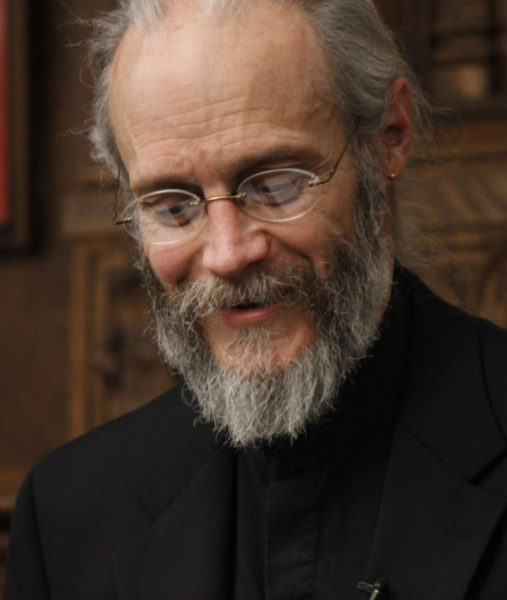 This fall, I walked over to Workman Hall in order to join the Cohort of 2018 for the weekly meeting of “Freshmen Chorale” (as the Registrar’s Office calls it). This course was added to the required curriculum of the Templeton Honors College two years ago as the first piece of then-Dean Jonathan Yonan’s vision to incorporate aesthetics into the Templeton curriculum. And, for the third time, our Service of Lessons & Carols included pieces sung by the “Templeton [Freshmen] Chorale”. Led by Professor David Bryant, this year’s offerings were “Er ist ein Ros” (a 16th-century German carol, sung in German), “Divinum Mysterium” (a medieval plainsong chant), and “Jesus is Coming” (an anti-apartheid African protest song also known as “Freedom is Coming”).
This fall, I walked over to Workman Hall in order to join the Cohort of 2018 for the weekly meeting of “Freshmen Chorale” (as the Registrar’s Office calls it). This course was added to the required curriculum of the Templeton Honors College two years ago as the first piece of then-Dean Jonathan Yonan’s vision to incorporate aesthetics into the Templeton curriculum. And, for the third time, our Service of Lessons & Carols included pieces sung by the “Templeton [Freshmen] Chorale”. Led by Professor David Bryant, this year’s offerings were “Er ist ein Ros” (a 16th-century German carol, sung in German), “Divinum Mysterium” (a medieval plainsong chant), and “Jesus is Coming” (an anti-apartheid African protest song also known as “Freedom is Coming”).
Why make music part of the Templeton curriculum?
As Dr. Yonan said in his Convocation address a few years ago, few things are as central to Christian worship as music and song, which implies that Christians ought to seek to understand it, especially if they are not musicians. (I might add that few things are as ubiquitous in modern life [think : Muzak]).
Freshmen Chorale offers an “inside” view of music—learning to pay attention to posture, breathing, the director, and the rest of the choir; learning to sing words and phrases rather than just getting the right notes; experiencing the work that goes into preparing pieces for a program; and even the discipline of learning to stand and sit together (lest confusion in the choir loft distract the congregation from their worship).
In The Silmarillion, J. R. R. Tolkien describes the world as created by song, just as in the beginning, when God created heaven and earth, the “morning stars shouted together for joy” (Job 38.7a); and in this life, Paul commends “speaking to each other with psalms and hymns and musical songs” (Ephesians 5.17); and, when God ushers in the new heavens and earth, all who are in Christ shall join the host of heaven in songs and shouts of praise, worship, and adoration—the sound of many rushing waters—as we read in the book of Revelation.
The spheres began to move,
And sung the great Creator’s praise
To all the Blest above;
So when the last and dreadful hour
This crumbling pageant shall devour,
The trumpet shall be heard on high,
The dead shall live, the living die,
And Music shall untune the sky!”
A popular round says, “All things shall vanish from under the sky. Music alone shall live, never to die”. We hope that Freshmen Chorale will make the Templeton Honors College into a place of increasing fellowship, fostered by worship, music, and song.
Dr. Fred Putnam is a professor in the Templeton Honors College and teaches every freshman cohort both Old and New Testament. Dr. Putnam received his doctorate from the Annenberg Research Institute, specializing in discourse analysis of biblical poetry and narrative, and has published several reference books on biblical Hebrew.








